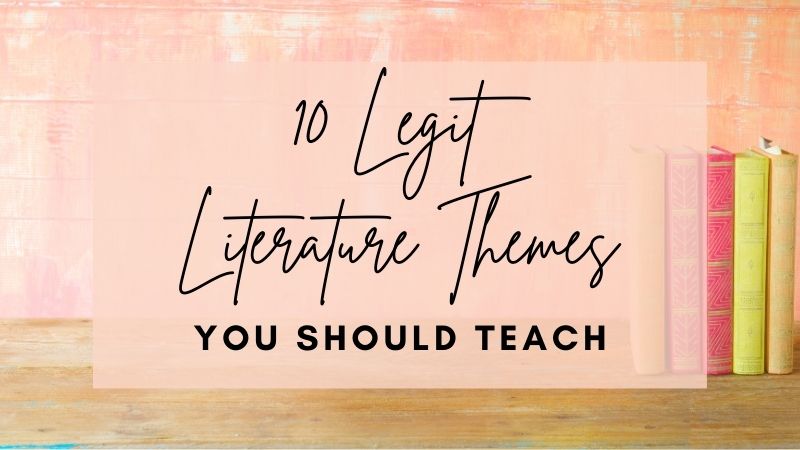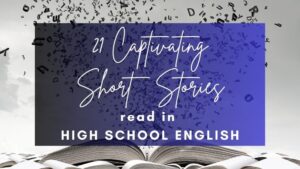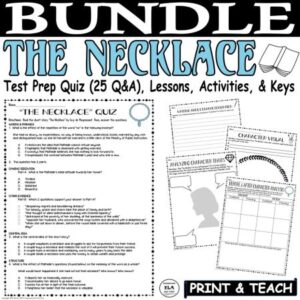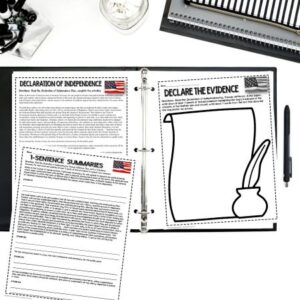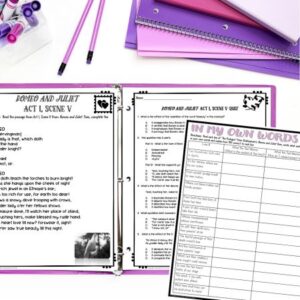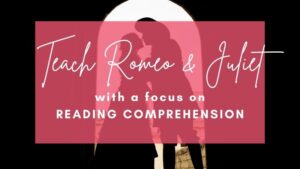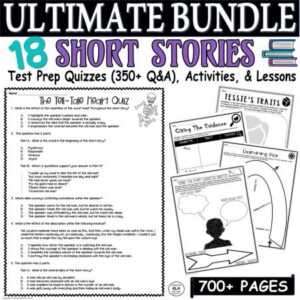10 Legit Literature Themes & Topics You Should Teach- While teaching reading comprehension is one of the most important things we do as English Teachers, I don’t think most of us got into this profession to accomplish only this goal. We want more for our students. Our collective pedagogy extends beyond teaching reading skills and wades into the enjoyment of reading both fiction and nonfiction, savoring compelling language that has shaped our education, and examining the diverse nature of literature themes we experience whenever we pick up a new text!
In short, we love to read and want our students to experience at least a taste of that literary passion!
I was THAT KID growing up who read at the lunch table, read while walking to class, and even read in class, when my work was done, of course 😉
In middle and high school, I continually chose books with similar literature themes, but it wasn’t until I got to college, that I expanded my personal taste and consumed a more varied library of texts.
So if you need some help with literature themes for secondary ELA, keep reading for examples and tips for teaching themes in classic literature!
Need help with Test Prep? Check out this FREE Pack of 3 Test Prep Activities to help students achieve success on standardized tests!

What is Theme in Literature?
Too often, we mix up themes and topics when discussing literature. In an English classroom, a topic is the subject/main concept of a text. A theme, however, is a message about that topic.
THEME STATEMENT EQUATION
Major Idea + Topic Phrase (What is the author trying to say?) = Theme Statement
Ultimately, we want students to be able to decipher and craft a theme statement about what they have read in a fictional text, BUT theme statements may look different depending on the student.
And that is completely okay as, usually, an author does not provide an explicitly stated theme.
Want ideas for short stories to teach literature themes? Click below!
10 Legit Literature Themes You Should Teach
1. Extreme pride comes with consequences. (PRIDE/HUBRIS)
Let’s be real. If you have been around for a while, you will understand that pride is considered one of the seven deadly sins for a reason.
When we puff ourselves up and think more highly of ourselves than we should, the inevitable fall via consequences will come.
There will always be someone better at something. There will always be something imperfect in our own creations. There will always be something that doesn’t go to plan.
If you have ever read Guy de Mauppassant’s “The Necklace,” you will understand this theme completely. The protagonist, Mathilde Loisel, lives a quiet, simple life, but she is discontent as she is focused on material wealth and prestige. When she is invited to a society event, she borrows her friend’s “diamond” necklace and subsequently loses it.
In an attempt to cover up the incident, she and her husband participate in hard labor for years to pay off a replacement necklace. In an offhand comment to the friend one day, she realizes that her pride caused her family’s financial hardship as the original necklace was fake.
Extreme pride will always come with some sort of consequence, and this theme is quite prevalent throughout literature!
2. Death is ultimately necessary and unavoidable. (DEATH)
“Death Be Not Proud,” “Sinners in the Hands of an Angry God,” and “The Masque of the Red Death” all center around the inevitability of death. While most people try to avoid dangerous situations, everyone will die one day.
It is what makes life so valuable. Without death, life has little meaning or purpose.
All three texts above embrace these literature themes that involve death, but they display death in different ways. As students read, they will be able to notice the similarities and differences, which makes expanding on the above theme even more fun and engaging!
3. People should never make assumptions about others. (PREJUDICE)
Jane Austen’s Pride and Prejudice embodies the theme that people should never make assumptions about others. Even reading short chapters or excerpts from this classic British text can be a fun and diverting way to bring higher-level literature themes into your classroom!
James Hurst’s “The Scarlet Ibis” exemplifies this theme as well. No one expects much from the protagonist’s brother, and so he defies all expectations.
Simply looking at someone and making assumptions based on physical appearance is PREJUDICE. This perspective is something we should avoid with abandon, and often, it is something students need to learn!
4. Freedom requires sacrifice. (LIBERTY)
Although nonfiction typically does not have an explicit message or theme, reading speeches, narratives, and articles with the literature themes lens can be engaging for students in their higher-level classes.
Patrick Henry’s speech “Give Me Liberty,” Jefferson’s Declaration of Independence, and Longfellow’s poem “Paul Revere’s Ride” all focus on the fight for freedom. Within each text, we see the clear perspective that freedom requires sacrifice. Unfortunately, many times, that sacrifice involves someone’s death.
In a world filled with entitlement and a severe lack of historical knowledge, we MUST teach our students this theme. The freedom many of us take for granted cost a great many people their livelihoods and even their lives!
Thought about teaching the Declaration of Independence? Click here!
5. Hatred will often produce unintended outcomes. (HATE)
Romeo and Juliet offers many literature themes; however, the hatred between two families provides good fodder for a focused thematic statement. As the families quarrel from start to finish, we see the effects of hate on many characters in the play.
Let’s be real, hate is all over the place nowadays.
If you don’t believe the status quo, you are canceled. If you don’t fall in line with societal expectations, you are dismissed. If you disagree with someone, you are that person’s enemy. If you have a different belief about something, you clearly have hatred in your heart.
Teaching this theme and others like it is vital for our students’ futures!
6. The truth is more important than what others believe. (WISDOM)
I think literature themes involving personal experience versus the supposed wisdom or commonly accepted knowledge of “experts” are VITAL as a part of our students’ education.
So often, we read and align ourselves with the rebel. We believe in them and want to jump into the pages of the story because they won’t accept the status quo that permeates our culture.

Too often, however, this concept does not play out in real life. People simply go with whatever the experts or those in authority say.
When did we go from a nation of people who questioned ideas to those who merely accepted what others say, simply because they have a degree or popular status or platform?
I did not read 1984 until I was more than 10 years into my teaching career, and I can easily say it changed me forever. I see propaganda everywhere I look now.
We have 3 stages of development as readers of literature themes and ideas:
- We are ignorant on a specific subject. We know nothing or very little about something.
- We gain knowledge about the subject through reading, listening, watching, or experiencing.
- We question that knowledge; most people never really get to this point. They go with whatever they first learned from a “trusted” source and die on that hill.
Don’t we all want our students to get to this 3rd stage? Guiding students through various literature themes can help in this development!
7. Most people would rather feel secure than be free. (PRIORITIES)
I remember reading about this concept in an argument prompt many many years ago. At that time, I would have written that this theme is false. After living under so many dictatorships and monarchies throughout history, of course, people would desire freedom above all else.
I don’t think this statement is true now. We saw this enacted in real-time in 2020 and 2021.
Bradbury’s “The Pedestrian” plays to this theme quite well. As people sit in their homes consuming whatever the government provides, one lone person walks the streets. While others are satisfied with mere traces of life, the protagonist holds onto his humanity.
What are we willing to give up to feel safe nowadays?
8. Too much technological consumption will lead to society’s downfall. (TECHNOLOGY)
We can see that literature themes involving technological advancement have become more ubiquitous over the last 50 years, and I am totally here for it. I love a good dystopian story.
From The Hunger Games to The Matrix, we can easily acknowledge a fear that lies in all of us concerning the takeover of technology in various aspects of our lives. It does not merely affect how we interact with people; it can affect politics, physical and mental health, and employment options.
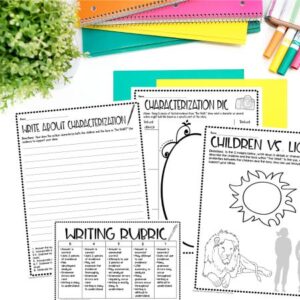
Unfortunately, for many young and old, we see technology shape people into solitary, self-involved consumers who spend long periods of time not truly interacting with other people. A text or social media comment is simply not the same as having someone over for dinner.
Ray Bradbury’s “The Veldt” and “The Pedestrian” both beg the question: Does technology really make our lives better?
These dystopic short stories can easily introduce our students to major literature themes we MUST confront as the future is now.
9. Fear often causes irrational behavior and actions. (FEAR)
Fear is such a powerful feeling. Until I had children, I never feared anything much. I just explored and had adventures without a second thought.
Now, with four souls to be responsible for, I experience worry and fear on a daily basis. And when our loved ones are threatened or we fear the unknown, we can behave quite irrationally.
Here are various texts related to fear:
- “The Masque of the Red Death”-fear of disease
- “The Lottery”-fear of modern times
- “The Monkey’s Paw”-fear of losing someone
- “Lamb to the Slaughter”-fear of abandonment
- “The Tell-Tale Heart”-fear of discovery
When we identify what we fear, it is much easier to recognize its effects. Teaching our students about these literature themes helps them to do the same!
10. Character is defined by actions not intentions. (INTEGRITY)
We have all heard the quote “The road to hell is paved with good intentions.” What we intend to accomplish does not always manifest into what we expect, and the same is true for our students, which is why we should teach certain literature themes!
Too often, people will believe something or say they live by a certain mantra; however, their actions completely negate their supposed ideals.
Consider Sojourner Truth’s “Ain’t I a Woman?” In a country that claims “All men are created equal,” Truth lives in a world and time filled with opposite actions.
In her speech, she states the following: “That man over there says that women need to be helped into carriages, and lifted over ditches, and to have the best place everywhere.”
The intentions are clear, but the actions are inadequate at best. We need our students to see how their own character is defined, not by what they say but by what they do.
- If you are passionate about the environment, what are you doing to help it stay clean?
- If you are concerned about others struggling with their finances, how are you offering help?
- If you are worried about your classmates, what can you do to offer assistance?
Ultimately, any change in the world starts with our actions, and often others will follow over time. Teaching literature themes like the above will provide help with this endeavor!
Why Teach Literature Themes?
- It helps students stay focused while reading.
- It helps students make connections to other texts.
- It helps students grow in their reading comprehension and analytical skills.
- It helps students discuss what they have read more effectively.
- It helps students broaden their horizons.
- It helps students build knowledge about the world.
- It helps students become better citizens.
- It helps students see the need for change in themselves.
- It helps students to see others beyond their circle.
- It helps students to mature into adulthood.
SHORT STORIES RESOURCE
Do you need readymade short stories with comprehension questions that help you teach classic fiction, literature themes, and reading test prep skills at the same time? This Short Story ULTIMATE BUNDLE with Lessons, Quizzes, and Activities uses the Common Core standards with reading comprehension QUESTIONS and ANSWERS for 18 short stories such as “The Most Dangerous Game,” “The Monkey’s Paw,” “The Tell-Tale Heart,” “After Twenty Years,” “The Gift of the Magi,” “The Veldt,” “The Lottery,” “The Pedestrian,” etc. modeled after various state reading exams.
Make teaching short stories SIMPLE & EASY!
Just PRINT & TEACH to cover MANY literature themes!!
Do you crave more fun activities that incorporate literature themes? Check out my store Kristin Menke-Integrated ELA Test Prep!

